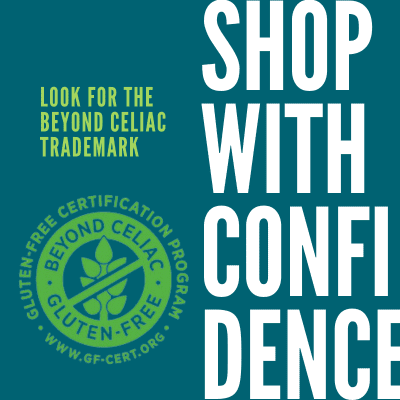Can you share what your role as the Director of GREAT Kitchens entails?
As Director of GREAT Kitchens, I create content and improvements to the GREAT Kitchens and GREAT Schools, Colleges and Camps programs. GREAT Kitchens and Schools are courses that teach people in the foodservice industry how to serve gluten-free meals safely. GREAT has evolved since I started working at Beyond Celiac five years ago. It has become a comprehensive program that gives wait staff, managers, chefs, cooks, and dishwashers the tools to do their part to make a safe gluten-free meal. Also, my role as Director of GREAT Kitchens provides opportunities of me to speak to those in the food industry across the country about the needs of the gluten-free guest. I also conduct on-site training for chefs, restaurant groups, and at regional restaurant shows. I love being an advocate for our community and hope to make an impact wherever I go so others will benefit from the training or education shared.
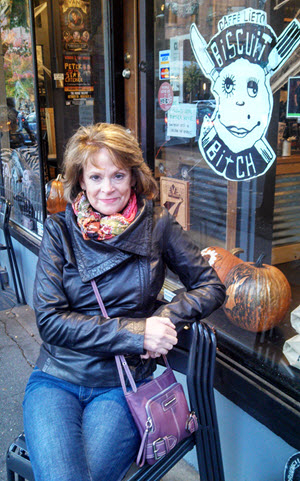
How does your role at Beyond Celiac impact the gluten-free community?
I’m proud to be leading GREAT Kitchens because it has the potential to make a difference in the daily lives of our community. I get very excited about the impact GREAT has for all of us with gluten-related disorders. It’s so satisfying to envision that even one dining service manager who applies GREAT Schools training at their school can now offer safe options for many students for years to come. Students can focus on their studies, college experience, making friends and just living life. When chefs and restaurant owners make the commitment to implement GREAT Kitchens in their restaurants, they are part of improving the quality of life for those in their community and travelers too. Each GREAT course completed can be utilized as a seed that grows awareness and understanding about safe gluten-free meals across the country.
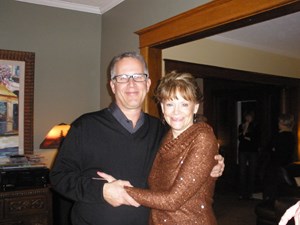
You and your husband own a sports bar in Nebraska that is trained through the Beyond Celiac GREAT Kitchens program. How has the business changed since implementing the training?
We have been offering gluten-free options for about seven years now. What seemed unique then seems common place to our staff now. Employees take gluten-free requests seriously and we use many of the protocols and tips outlined in GREAT Kitchens in our restaurant, such as serving gluten-free meals in color-coded baskets. The loyalty of our customers and word-of-mouth marketing has been great too. I love seeing coaches choosing Sportscasters over other restaurants because all can be accommodated. My favorite moment was watching a little seven year old boy hanging out with his baseball buddies and feeling a part of the team… eating burgers with the guys. Very special moment.
Some restaurants put a disclaimer on their gluten-free menus. What does a disclaimer like this mean and how can a diner determine if a meal is actually safe for them?
Disclaimers should be information boxes. They should help the diner make educated decisions. Sometimes the message gets caught up in legal jargon and that’s not serving the restaurant or diner well. Being transparent about what can be offered includes information about preparation protocols, clear ingredient descriptions, and prices, all of which should be included on the menu. Focus on what you can offer safely, not what you can’t offer.
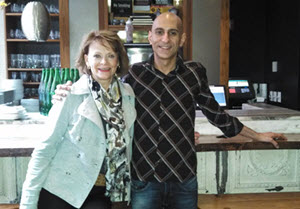
Since you have celiac disease and are often traveling to educate foodservice professionals, can you share your process for selecting a restaurant and ordering your meal?
First I try to eat at a GREAT Kitchen, of course! Or I try to reach out to friends who may live there or know the area for suggestions. I use dining apps (like Find Me Gluten-Free) to narrow down the choices and read the reviews. However, I don’t base my decision to dine or not on the reviews because I don’t know the level of concern of the reviewer. I always try to call ahead to tell them I’m coming and express my needs. I specifically tell the host that I have celiac disease, and if they have wait staff familiar with special diets to seat me in their section. Also, I ask multiple questions like those on the Beyond Celiac Dining Tips sheet. If the restaurant has a chef’s table overlooking the kitchen, I like to dine there. You can learn a lot by watching the staff fly around the kitchen preparing meals. If the menu doesn’t have adequate information or icons to denote gluten-free options, I request suggestions from the chef. Listening to these responses gives me an idea about their level of training and care. After the meal, I always leave my card and write a note of thanks with the tip if my experience was positive.
If you feel uncertain about an establishment’s ability to safely serve food once you have arrived and been seated, what do you do?
I ask to speak to the manager or chef if I’m not confident with the responses from the server. I think it’s important to try to work through it, though, and give the restaurant a chance. This is a great opportunity not only to teach, but to also to help the restaurant realize it needs education. If I still don’t feel comfortable, I leave. I’m not taking chances. I grab a business card and contact them the next day with information about GREAT Kitchens. Of course, I always try to have food with me when I travel. It’s not as much fun eating hummus and gluten-free crackers in your room, but sometimes that’s the reality.
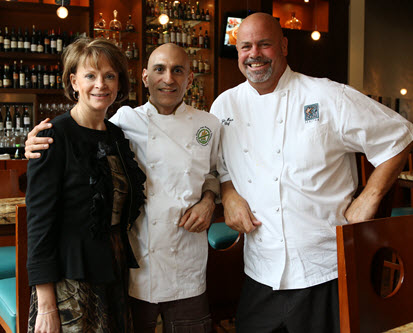
Have you ever been “glutened” at a restaurant? What’s your best advice for handling this kind of situation?
Unfortunately it’s happened a few times especially while traveling. I’ve spent nights on some hotel bathroom floors over the years. When I have to speak at a conference the next day or teach a training session, this is really tough because I just have to soldier on and live through the pain.
My advice is to take care of you first, and then discuss the situation later with the restaurant. It’s really important to let them know what happened so they can correct it. If you just decide not to return, complain to friends, or blast them on social media, they can’t fix the problem. Also it’s important to help keep our community safe. You don’t want this to happen to anyone else, right?
If you are still at the restaurant when you realize the mistake or accidental ingestion, get the contact information for the manager. Then, contact the manager later during a slow period – early morning or mid-day and calmly explain what happened. Sharing the information on the receipt can be helpful because it contains the date, time, what you ordered, and server’s name, so have that available when you make a call or drop in at the restaurant. In GREAT Kitchens training, we provide an “incident report” for restaurants to use to gather information in order to determine how and when the mistake happened, and then we suggest they take corrective action.
Mistakes do happen and it can happen anywhere in the foodservice chain. An ingredient can change in a product without the chef knowing it, a cook can change the recipe by adding a “secret ingredient” to the sauce, gloves aren’t changed, bread knives can slice baked potatoes, new employees aren’t trained yet, teriyaki sauce residue is on the grill… All of these actions can cause reactions and none of them are done intentionally to make us sick. But if the restaurant doesn’t realize the result of the action, it’s not going to change and they won’t even know that there is a problem. Sometimes, chefs and restaurateurs don’t know what they don’t know – it’s up to the diners to voice their needs and encourage restaurant education through the GREAT Kitchens gluten-free training program.


